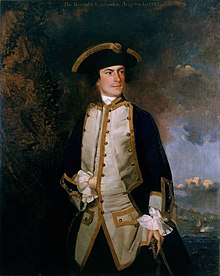Who Wrote the “Account of Lexington”?
In 1953 J. E. Tyler published an article in the William and Mary Quarterly titled “An Account of Lexington in the Rockingham Mss. at Sheffield.”
This account appeared in two letters, the first dated 23 Apr 1775 and the second written a short time later. They were addressed to a friend named “Rogers,” with whom the writer had served “at Jamaica,” and offered news and good wishes for “the Admiral.”
That appears to have been Adm. Augustus Keppel (1725–1786, shown here), who brought the letters (or copies of them) to the Marquess of Rockingham’s cottage in Wimbledon. Ultimately the marchioness filed those copies or further copies.
Tyler wrote: “it is the more unfortunate that the signatures, though copied along with the main text of the letters, have been heavily cancelled, since it is now virtually impossible to establish the identity of the writer.” The clues that remain show that that person:
However, as reported yesterday, Crozier died in November 1774. He had been in command of the Empress of Russia, and his name might have lingered in some naval records, but he didn’t see the start of the war.
Documents in Gage’s papers confirm that the Empress of Russia was in Boston harbor from April 1775 to the end of the year, when it sailed to the Caribbean for supplies. The commander of the vessel in those months was Lt. John Bourmaster (1736–1807), agent for all the transports to Boston and thus a liaison between navy and army.
Bourmaster was a merchant seaman for most of the 1750s, passing the exam to become a Royal Navy lieutenant in late 1759. His first assignment was H.M.S. Valiant, commanded by Adm. Keppel from 1759 to 1764. Starting in late 1762, Keppel was in command of the Jamaica station. Keppel’s secretary was George Rogers, who would be on the Admiralty Board by the end of the war.
After a slow start, Bourmaster’s Royal Navy career also took off. He became a captain in 1777, a rear admiral in 1794, and a full admiral in 1804. The year 1797 saw the marriage of “Harriet, youngest daughter of Admiral John Bourmaster, of Titchfield”—meaning he had more than one daughter.
Thus, all the clues in those letters are consistent with the writer being Lt. John Bourmaster.
This account appeared in two letters, the first dated 23 Apr 1775 and the second written a short time later. They were addressed to a friend named “Rogers,” with whom the writer had served “at Jamaica,” and offered news and good wishes for “the Admiral.”
That appears to have been Adm. Augustus Keppel (1725–1786, shown here), who brought the letters (or copies of them) to the Marquess of Rockingham’s cottage in Wimbledon. Ultimately the marchioness filed those copies or further copies.
Tyler wrote: “it is the more unfortunate that the signatures, though copied along with the main text of the letters, have been heavily cancelled, since it is now virtually impossible to establish the identity of the writer.” The clues that remain show that that person:
- wrote from “Empress of Russia Boston April 23th.”
- signed “what appears to be the initial letter ‘J’” at the start of his name.
- described himself as “an Old Valiant.”
- planned also to write “to my precious Girls.”
- promised to show Rogers’s letter to “The General [Thomas Gage] and Earl Percy.”
However, as reported yesterday, Crozier died in November 1774. He had been in command of the Empress of Russia, and his name might have lingered in some naval records, but he didn’t see the start of the war.
Documents in Gage’s papers confirm that the Empress of Russia was in Boston harbor from April 1775 to the end of the year, when it sailed to the Caribbean for supplies. The commander of the vessel in those months was Lt. John Bourmaster (1736–1807), agent for all the transports to Boston and thus a liaison between navy and army.
Bourmaster was a merchant seaman for most of the 1750s, passing the exam to become a Royal Navy lieutenant in late 1759. His first assignment was H.M.S. Valiant, commanded by Adm. Keppel from 1759 to 1764. Starting in late 1762, Keppel was in command of the Jamaica station. Keppel’s secretary was George Rogers, who would be on the Admiralty Board by the end of the war.
After a slow start, Bourmaster’s Royal Navy career also took off. He became a captain in 1777, a rear admiral in 1794, and a full admiral in 1804. The year 1797 saw the marriage of “Harriet, youngest daughter of Admiral John Bourmaster, of Titchfield”—meaning he had more than one daughter.
Thus, all the clues in those letters are consistent with the writer being Lt. John Bourmaster.


